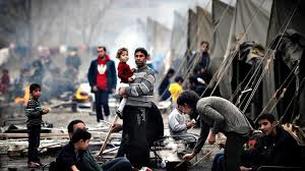 Writer: Hana Thai educates readers on the status of Palestinian refugees, the condition they live under, and organizations that can help them. Generations of Palestinians and their families who have been dispersed as a result of the 1948 An-Nakba (catastrophe) are not only unable to return home, but they are also deprived of normal lives by the countries they seek refuge in. The current number of registered refugees, living in 59 refugee camps in Lebanon, Jordan, Syria, the West Bank, and the Gaza Strip, under UNRWA’s care has now reached over 4.4 million people.
There are 450,000 registered Palestinian refugees who live in Lebanon, reportedly the country with the highest number of refugees living in utter poverty. Fifty percent of households are living on the equivalent of less than $2 per person per day. High population density combined with inadequate infrastructure make the conditions of these camps hardly fit for life. Most of the countries that allow Palestinian refugee camps to exist within their borders, including Lebanon, also enact laws that marginalize Palestinians - banning them from holding certain occupations, withholding property rights and means to proper healthcare, as well as limiting access to education - preventing them from reaching decent quality of life. The results of a study done by Dr. Rima Habib shine a harsh light on the plight of Palestinians living in Lebanon, “Analysis of predictors of chronic illness showed that the prevalence of chronic illnesses was significantly positively correlated with water leakage and negatively correlated with household assets, supporting the link between poverty and health in these communities...42% of dwellings had water leaking from the roof or walls and 8% were composed of building materials that are dangerous to health”. Families can hardly afford food much less anything better than the conditions that they are forced to call home. It’s been shown that many Palestinian refugees are willing to work to improve their situation. But according to the Palestine-Israel Journal, between 1982 and 1992, all Palestinian refugees who applied for work permits were rejected. Even when they receive a permit, the refugees are largely restricted to menial labor in such areas as construction, electricity, sanitation, agriculture, textiles and carpets, smelting, car wash and lubrication. The Huffington Post writes about the learned helplessness that young Palestinian refugees are faced with in a system that is designed to fail them. The only life they know is day to day to survival - children are dropping out of school to support their families. Mahmoud Mashwara was twelve years old when he left school to sell candy on the street. He began working full-time to help his family survive. "I thought, I'll go back to school when I go back to Palestine," Mashwara, now 16, told Al Jazeera. Mohamad Jabbar makes $10 a day at his butcher shop, just a tenth of what he could earn if Lebanese authorities allowed him to operate outside the military-guarded camp in Beddawi. "It's like living in a prison," Jabbar said. "The government controls where I live and where I work”. Even refugees with degrees in their respective fields, such as electrician Mustafa Shehada and chemical engineer Nazih Chabayeta, either cannot find jobs outside their camps or are fired once their bosses find out that they are Palestinian. Chabayeta says, “We are prohibited from working so we don’t compete with Lebanese citizens”. But Ali Howeidy of the Palestinian Return Center explains the flaw with that logic, “If Palestinians worked here [Lebanon], they’d spend their salary in the country and contribute to its economy”. Lack of access to employment force refugees to be dependent on underfunded humanitarian charities, allowing the cycle of poverty to continue. Despite the disastrous situation, ANERA is an active NGO dedicated to improving the lives of Palestinian refugees living in Lebanon. According to their website, “Anera and other aid groups are able to provide overall, long-term, sustainable assistance — deploying emergency relief resources as well as maintainable water, health, education and economic development projects”. Their “How to Help” page details ways in which people can make a difference by doing something as small as giving a $10 donation a month or hosting a fundraising event to bring awareness to the cause. Change will not happen overnight, but it is crucial to recognize the unacceptable circumstances of Palestinian refugees living in Lebanon and that we have the power to do something about it.
1 Comment
|
|
